#I have never given money to WotC and I never wish to
Explore tagged Tumblr posts
Text
I think that when D&D players say that, in contrast to other TTRPGs, D&D is "easy to learn", they are relying on the other person in the conversation to understand the fact that, for the vast majority of players, learning the rules of D&D involves some combination of the following three activities:
playing D&D with a group of friends, some of whom know the rules (to a sometimes, like, encyclopedic degree) and are willing -- often eager -- to patiently explain said rules; additionally, in this circumstance, the explanation and discussing of rules functions as a major fun element of the experience of playing together
watching/listening to at least one and probably several different long-form actual play shows, almost always featuring professional entertainers (comedians, podcasters, voice actors, youtubers, video game writers, etc) doing a good job of making the experience entertaining and often explaining (or learning aloud) the rules as they do it
googling rules and finding a hundred thousand people discussing and poring over the rules all across the internet
like, I'd say that most people who play D&D -- even people who know the rules really well -- rarely (or never) have actually technically read the official original rulebooks.
[shouting desperately over the crowd] it's not about the rules themselves being easy to understand! it's about how ubiquitous community explanation and discussion of the rules is!
players who only play D&D are less likely to pick up other games, not because they think "reading the rules is harder than reading D&D's rules", but because reading D&D's rules isn't how people learn the rules of D&D, and the ways people usually do learn the rules of D&D are often less readily available for other TTRPGs!
if the way Tammy learned D&D was her best friend Stephanie explaining them to her as they watched Fantasy High, and then she filled in the gaps by googling the minutiae and scrolling around fifty forum discussions and Reddit posts until finding answers...
...then if Stephanie doesn't know [specific TTRPG] and Dimension 20 didn't have a [specific TTRPG] season and there aren't a lot of [specific TTRPG] forum posts, then you're not going to convince Tammy that [specific TTRPG] is "easier to learn than D&D", because it isn't "easier to learn than D&D" for Tammy! no matter how simple [specific TTRPG]'s rules are!
and! if you go out of your way to deride and insult Tammy for this, then guess what!! you're not the good guy here!!! you're just being kinda mean for no reason!!!! and you're giving non-D&D TTRPG players a bad name!!!!! holy shit!!!!!! did we all forget that TTRPGs are primarily a community thing or what!!!!!!!
#also#this isn't really related#but we need to stop equating ''D&D player'' with ''supporter of WotC''#I play D&D and I actively wish for the downfall and demise of WotC every day#I have never given money to WotC and I never wish to
67 notes
·
View notes
Text
What Is Wanting and What Is Owed
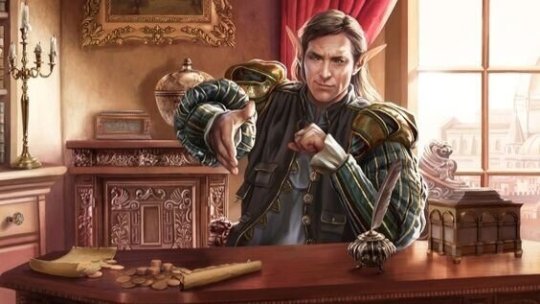
Hullo, Gentle Readers. Since I’ve been given the rare gift of a 5th Monday this month, I get a freestyle article. And, although I don’t often like to get on a soapbox, I’m going to do so a little. If you don’t want to hear me pontificate, you may want to skip this article and come back on Thursday.
During its recent D&D “Live” event, a few products were announced. Rime of the Frostmaiden was announced as the new adventure. While I’m personally meh about the whole Drizzt/Icewind Dale storyline, books, etc, I recognize that they’re an incredibly popular property, and I’m looking forward to seeing new monster stat blocks and so on. In proximity to this announcement came three other announcements, all of which I thought of as very positive, but which, to my surprise, brought a ton of venom from other D&D players.
Beadle & Grimm’s announced a Platinum Edition of the mod. No surprise there.
WotC announced Heroes’ Feast, the official D&D cookbook, from the same team that did the beautiful Art & Arcana book.
And finally, WotC made an announcement, which I will not go over again here, about how they wanted to show more sensitivity when presenting cultures based on real world cultures. You can read this in full at https://dnd.wizards.com/articles/features/diversity-and-dnd
I was pleased with all these announcements, but I was shocked (I guess I shouldn’t be any more?) about the level of venom I saw online about all three of them.
The B&G announcements was met with comments like, “$500? For that, the adventure had better run itself for me!” “Does it actually cast the spells?” and so on. For full disclosure, I have bought everyone of the Beadle & Grimm’s products. I ordered Waterdeep: Dragon Heist with a lot of trepidation, because $500.00 is a decent chunk of change for me. After receiving it and being blown away by what it contained, I knew we’d be buying other products as they came down the line.
The fact is that I am the target audience for B&G products: I’m a huge D&D fan, as is my husband, and we have a decent amount of disposable income to spend on our major hobbies, which includes TTRPGs. If you’re not in that target audience, then of course you’re not going to buy it, but I don’t see the value in tearing down others who make that decision. I guess, if anything, it’s likely motivated by jealousy. That’s a pretty natural human emotion, but it would be nice to see the honest reaction behind it.
The reactions to the cookbook seem to range from “I won’t waste my money on this” to “Well, they’re gonna lose money on this one” all the way to “Why is WotC wasting time with all-fluff products like this? They should be working on XXXX, because I’ve been waiting years for it.” I can understand not wanting to spend money on something you don’t want or need; that’s sensible. I’m personally charmed by the idea of an official cookbook, because I love to cook, so I’ll be grabbing this. I was actually pondering a fantasy-based cookbook project myself, but now I’ll wait to see what this looks like and if it scratches the itch I have for such a product.
So is WotC wasting talent on this? No, they’re not. The people who are writing this are the same freelance team that worked on Art & Arcana, so no WotC authors were dragged away from valuable work for this. Also, this isn’t one of WotC’s normal books that they release in a year. We’ll still be getting all the fluff and crunch this year that we normally would, but those of us who like the idea of a cookbook will get one.
Oh, and as far as losing money goes, I’d like to tell you about a book called Leaves from the Inn of the Last Home. When the Dragonlance novels and modules came out, they were incredibly popular. They were so popular that the demand for more material about that world prompted TSR to publish Leaves. It was all fluff and no crunch. You got everything from astronomy notes to sheet music to...oh, gosh...recipes. And it was a massive seller. It sold so well that they ended up making two sequels to it. So I think WotC will be okay with this one. And if not, they just won’t do another project like this down the line.
I think what bothers me about this one is really the sense of entitlement. Way too many posts seemed to boil down to, “This isn’t what I want; I want XXXX. WotC owes it to me.” Like, really, no they don’t. Every time WotC has a product announcement, I cross my fingers for Spelljammer, because I have an irrational love of its silliness and the imagination that went into it. But it would NEVER occur to me to think that WotC somehow owes me Spelljammer. WotC is a company, and the core principle of every company is to make money. I’m sure that, if WotC eventually thinks Spelljammer will make it money, that it’ll happen, but they know that Forgotten Realms is their bread and butter, so I’m not holding my breath.
I’ve been going on for a long time, but the last one is the one that cuts me deepest to the quick, so I can’t ignore it. It’ll probably come as no surprise to anyone that, as a very liberal/progessive gay man, I was disgusted to see so many comments condemning WotC for bowing to political correctness or for doing this “just to make money”.
As far as making money goes, I have already said, that’s what a company wants to do. I think you’d have to be blind not to see the surging tide of people in the U.S. and across the world who are sick and tired of inequality. The fight for equal treatment for people of color, for women in general, for gay people, for trans people...it’s still raging. For every victory, like the Supreme Court case that said workplaces couldn’t fire people for being of LGBTQ+ status, there’s a crushing setback, like President Trump’s executive order to allow hospitals to discriminate against trans people. But things seem to be shifting again, and people are more and more stepping up to declare their dedication to the fight. So yes, if I were running a company, I would be taking notice, and I would be taking actions in this direction.
What I do not and will not understand are people who are somehow going to claim to be upset that WotC is going to take steps to try to not offend people in the future. It bothers me that people can’t say, “Well, I’m not personally offended, but I’m not black/Romani/gay/Asian/Native American/whatever. I think it’s great that WotC is trying to make sure D&D is more inclusive for everyone.” I don’t understand how anyone can play a game like D&D...a game that literally makes you walk in someone else’s shoes...and yet have so little ability to do it in your actual life. D&D literally shows you how different people with different abilities have to work together to help each other achieve a goal, and it’s sad to see that some who play it have so little regard for people who are different from themselves.
If you’ve stuck through this article this far, I wish I could offer you some great wisdom at the end. I guess I’ll just caution you to spend a moment thinking about what you’re going to say online before you say it. Once your words are out there, they’re very hard to take back, and that can have consequences. I try my best to make most of my interactions online with people positive ones. Even when I don’t agree with people, I try to be positive, and to educate them as to my side of the argument, rather than just blasting them with “No, you’re wrong for thinking that.” I thought long and hard before writing this article, and I thought long and hard before publishing it. I may lose readers over it, and, if so, that would be a shame, but I would rather be honest about who I am and what I believe.
So be kind to one another. To borrow a quote from Critical Role, “Don’t forget to love each other.” Roll those 20s. And we’ll be back on Thursday with a fun question about running a campaign that begins before Session Zero. Whaaaaat? You heard me. See you then!
43 notes
·
View notes
Text
Spell Components & You, Pt. 1
I got to thinking about my comment about material/focus components in the Animator homebrew Sorcerous Origin and thought, “Hey! This can be a nifty guide!” It’s going to be fairly bare-bones, though, as I want it to translate between editions.
There are five components a Sorcerer needs to worry about: Verbal, Somatic, Material, Focus, and XP. (The only other one that exists, to my knowledge, is Divine Focus [{un}holy symbol]. There might be an archetype somewhere which requires it. Eh.) If you were to flip M and F, these would be in order best to worst. 5e combines M and F for a minor/no reason (see below). XP only existed in 3.0 and 3.5 (barring some aberration in a later edition). Generally speaking, if you can avoid having an extra component, you should: components are ways for enemies to stop your casting without having dispel magic, counterspells, or antimagic field ready. These exist also for flavor, but if they were only flavor all of them (well, except XP) would be entirely optional. All of that said, I don’t recommend using metamagic to negate verbal and somatic components unless the situation demands it, as almost all spells require those two components.
Verbal
Incantations. Words/songs of power are so intimately associated with magic that a good portion of our words for magic refer to singing (charm, enchantment, evocation/invocation, possibly glamour, grimoire, spell, etc.); Bardic Music is simultaneously the epitome of this (being a mechanic that actually deals with how speech works) and redundant.
Contrary to a lot of fiction (YuYu Hakusho is the first to come to mind, but there are others) but aligning with others, no target needs to be able to hear your verbal components for them to work -- you just have to pronounce them correctly. (This implies that you’re invoking the magic, though earlier editions did specify that no one was quite sure why the words worked, just that they had to be exact.)
Counteracting verbal components is the second most difficult of the five (after XP), but is also the most widely known course to take -- to the point that the spell silence has become the term most often seen in other games for status effects that prevent casting, even if they don’t literally interrupt sound. The go-to methods are deafening the caster, spells like silence which prevent the caster from speaking at all, and gags. Obviously, gagging is fairly difficult (you have to apprehend the caster first), but deafening and silencing casters through other means are almost always magical effects anyway.
Verbal components are also the easiest to get rid of (besides Somatic ones): 3.x has the Silent Spell metamagic feat (+1 level), 5e combines that with 3.x’s Still Spell at a reduced cost, and there are references here and there to allowing deaf/hard-of-hearing casters to ignore this penalty.
Somatic
Gestures. “Somatic” means “having to do with the body;” you’d think TSR or WotC could have come up with a better word for these, but whatever. Somatic components are the reason used to justify armor interfering with arcane magic. Given that you can wear gauntlets as weapons in 3.x without incurring the penalty and almost all types of armor interfere with casting regardless of whether or not they include gauntlets (and regardless of the edition), it would seem that you need a very good range of motion with your arms at a decent speed in order to cast spells with somatic components.
In both 3.x and 5e, you must have at least one hand free in order to cast a spell. This is probably to skirt around action economy for dropping, stowing, and picking up items/weapons, specifically so that you can hold a staff and cast. There are a number of options in 3.x for using a weapon (which could be a staff) to cast your somatic components, but this is mainly for eldritch knight types who want to dual-wield.
Anything that restrains a caster can justify interfering or negating spells with somatic components. This is why grappling a caster is a common tactic (besides Strength being a stereotypical dump stat).
Material and Focus
3.x distinguished between Material and Focus components in definition: spells always consume any material components they specify but never any focus components. However, this caused some wonkiness in gameplay: they get used similarly (the rules don’t even specify if you need to hold them, let alone if you can hold them in the same hand doing your gestures), but rules which apply to one don’t often apply to the other.
For example, the Eschew Materials feat (3.x, 3.P) lets you ignore any material components costing 1 gp. or less. In theory, this means you wouldn’t need to buy a spell component pouch (or spend money on upkeep for one if your DM were to go that route). In practice, it doesn’t also apply to foci, which means either you need to buy a spell component pouch, ask your DM for an exception, or avoid certain spells (there are several and many are desirable).
5e combined the two into a single mechanic and instead specified in each spell description whether or not the component got consumed. That’s slightly better; I think it would have been easier to include Focus components under Spellcasting: Casting a Spell -- Components and simply state that any rule that governs Material components also applies to Foci, but that they aren’t used up in the casting process. That would leave a simple M & F notation rather than redundant verbiage. Six of one, half a dozen of the other.
In general, a focus is better than a material component because you don’t have to worry about replacing it. Thus, if you were playing something by strict RAW and didn’t have access to 5e’s (glorious) addition of spellcasting foci (which should have been in the game from OD&D), you could fill a spell component pouch with your foci and (likely) never have to spend any money on upkeep. (Perhaps every time you learned a new spell with a focus.)
That’s not much of a consolation. Any effect which can steal from you can disable spells with either component. Any effect which stops a spell with a somatic component also stops one with a material or focus component. The Animator Sorcerous Origin sidestepped both of these in that the focus could also be environmental, but since that requires you to be around something specific for each of your spells, it’s not a consolation prize.
The worst aspect of these sorts of components is that many are costly -- often hundreds or thousands of gp. worth of gems and precious metals, frequently shattered or ground into dust.
Experience
As far as I am aware, Pathfinder got rid of XP costs in spells and 5e followed suit. I could be wrong on the latter, but Pathfinder was pretty strict about getting rid of XP costs in magic (it was a cornerstone of magic item creation in 3.0 and 3.5). 3.5 didn’t have many core spells with XP costs (14: atonement, awaken, commune, gate, limited wish/miracle/wish, permanency, the planar ally series, greater restoration, simulacrum, and vision), but there were others scattered hither and yon.
I note this component at all for two reasons: first, for anyone converting between 3.5 and Pathfinder to pay attention to these when converting, and second, to point out that XP costs (while horrible) had the advantage of being uncounterable (no one and nothing could prevent you from using the component as a way of interrupting the spell). You could use that to build a new casting method, but why would you?
Other Notes
The main combat advantage psionics has had over arcane magic in most editions (other than being overpowered due to an idiotic lack of transparency) is that powers usually didn’t require components (though they did have tells). The psychic magic system of Pathfinder‘s Occult Adventures supplement does have thought and emotion components, but as these are entirely mental all they do is give alternatives to the silence spell as ways to stop casters.
I will have a part two, which will be entirely about why spells specify material components and which spells to think about regarding material/focus costs.
18 notes
·
View notes
Text
Talks Machina Highlights - Critical Role C2E19 (May 22, 2018)
Tonight’s guests are Travis Willingham and Matt Mercer (both in human and pillow form)!
Pre-show is blessed by a Tess Fowler original!
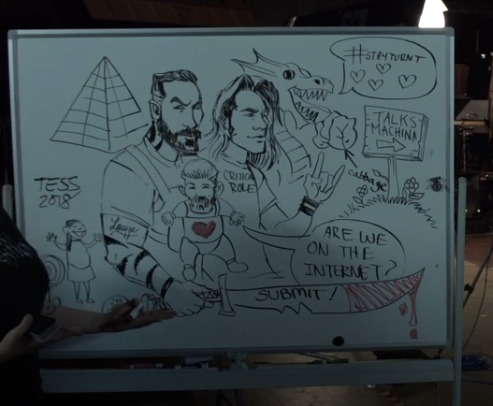
Announcements: Critrole.com is the new website, there’s a new partnership with Stack-Up and some fun merchandise associated with that (see website for details!), hardcover comic will be on sale on May 31 (see website for details!), the Stream of Many Eyes will be featuring most of the cast starting on June 1 (see... website for details? okay, no, it’s on the WotC website), Travis wants to be a red panda in the next Honey Heist (I... don’t think that’s on the website), there’s now a Talks Machina Instagram account that will feature behind-the-scenes stuff (you know where to go).
@critrolestats for this episode: last time two player characters fought each other in the main campaign was episode 99 (feat. Jon Heder’s character), the Mighty Nein has collectively earned over 6,250 gold since the campaign started, and the party has given Pumat Sol 5,030 gold since they met him, a substantial amount of which went toward Caleb’s paper and ink.
Matt’s Jester voice gets brought up again, and Brian points out that he’ll probably have to cover for Laura for a bit going forward. Matt: “That’s if Jester survives...”
Travis: “We’re just going to have the baby and put it on the table and that’s going to be our new mini.”
If Fjord had lost the gamble with the Gentleman, he would’ve taken the money but mostly just would’ve been appreciative that he was brazen enough to make the gamble. It was a test to see how the party adjusted, how they held their own. Matt: “Everything with him is very much a power dynamic game and trying to read whoever he’s talking with. That’s how he got where he is today.”
Fjord’s been very cautious when it comes to asking questions about the things he needs to know about his backstory, and that might change going forward. Travis is very aware that as soon as he figures something out, Matt will throw him a curveball. Matt points out that every story will have a different pace of unveiling, based in part just on pure geography and where the party happens to be at any given time. He mentions that Fjord’s backstory is a little more complicated than some of the others. Travis is delighted to actually not know some big parts of Fjord’s backstory (including the identity of his warlock patron), and Matt talks about what a gift those backstory gaps are to a DM, because it establishes both investment and the opportunity to surprise the player.
The fight scene in the Leaky Tap was mainly just meant to be flavor and establishing that locales are dynamic and evolving, a little different each time you walk in. Travis: “Taco Tuesday.” Brian: “Sacrifice Saturday.”
Gif of the Week: steeple vs. staple is an important distinction.
Matt had four or five different possible story hooks prepared for the party based on where they decided to go. Brian points out that Matt generally has his contingencies covered; Matt explains that a lot of it isn’t very detailed but lends itself well to getting fleshed out later. He also talks about the balance between leading the narrative (to keep players from being overwhelmed) and providing the open-world feeling.
Fjord is “a little bit... kind of... somewhat” relieved not to be going back to the Menagerie Coast. There’s some unfinished business he’s not sure how to confront yet. Matt: “Expertly danced around.”
Matt didn’t intend for Fjord to take the “devour” thing literally. Travis makes a lot of faces about that. Matt points out that it made for a very cool visual. Brian: “Yeah, deep-fjoat.” Travis is a little concerned the next weapon may be a mace.
Travis was disappointed not to get to find out what was going on with the orc, but he was determined not to metagame it. He’s hoping Molly and Yasha bring it up again.
Liam and Sam put together a whole list of cons Nott and Caleb have at their disposal; they haven’t even showed the list to Matt.
On the goblins, Matt mentions: “There are reasons why they were there. None that came to light or were investigated fully.” A history check may have discerned where those goblins came from.
Fanart of the Week: Yasha’s necrotic shroud.
Travis’s big reaction over Nott’s backstory was when he started to realize what she was looking for from Caleb. From Fjord’s perspective, he has a massive sense of empathy and compassion for Nott after that reveal; there was a lot in what she was saying that Fjord recognized. He’s looking forward to talking to her about it later.
After building so much, Matt loves the backstory reveals because they really exemplify the players’ chance to make it a true collaboration and do some creative building of their own.
Matt was not expecting Yasha to tell Trent she was from Xhorhas. “Oh, you just made yourself real interesting.”
Travis went back and watched Caleb’s backstory scene at Liam’s urging (they enjoyed the scene as it played out, but when it unexpectedly got as intense as it did, Liam wished the rest of them had been there to enjoy the reveal; it also avoids having to repeat all the information verbatim in the future). It worked in the spirit of experimentation, but in the future they’re probably going to limit it to shorter scenes at the DM’s discretion.
Matt: “I feel that anything is capable of deep evil, and anything is capable of deep good.” Brian: “So for you, evil isn’t a permanent characteristic in that regard.” Matt: “Yeah.”
Travis: “I didn’t think there was any hell deeper or hotter than shopping... and then I went to the library with Caleb.” Brian: “If you cut out everything in the episode that bored Travis, there wouldn’t be much left.” Matt: “Oh, I’m never catering to this motherfucker.” He points out that they’re still finding the balance there as well; he hasn’t had a character in a long time that’s actively trying to research everything in the world around him, but they’re looking for solutions to prevent in-game info dumps.
Talks Machina: All The Stars Of Critical Role Are Out Tonight
Travis got asked “would you like to rage with that?” by a Starbucks barista. He’s embarrassed that he had “non-cool groceries” with him at the time. A debate ensues about what exactly would constitute cool groceries.
Matt talks about going through the TSA checkpoint and one of the agents telling Sam “Right this way, Mr. Shorthalt.” Taliesin had a metal pepperbox gift from a fan in his bag that he forgot to check, and the TSA guy said, “It would be Percy, wouldn’t it?”
On pricing magical items, Matt uses his judgment about the item’s relative usefulness to somewhat arbitrarily pick a value within the suggested price ranges for that rarity in the DMG.
Matt has had extremely vivid dreams of himself wandering around Exandria on several occasions, and always feels warm and fuzzy afterwards. One dream about the Age of Arcanum heavily influenced his designs.
In a melee fight, Fjord would be most interested in fighting either Caleb (as the only one he’d be likely to beat) or Yasha (to get his ass kicked).
Favorite bad decision snack? Travis is all about shaved ice and Oreos dipped in peanut butter. Brian’s weakness is Cheeto Puffs and animal crackers dipped in cake frosting.
Travis does the Jester voice with the little Jester doll, and Matt pounces on it as the solution for Laura’s upcoming absence.
Matt won’t comment on what the jerky was actually made of. Dani: “Maybe they’ve also tasted baby.”
Brian tells a story about beef jerky. Matt: “Brian... you may be my favorite supervillain.”
375 notes
·
View notes
Text
Magic the Gathering Rarities: Celebration Card Trinity on Trade Group
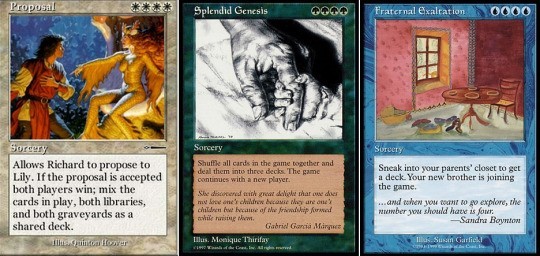
A few weeks ago, I came across something extraordinary in the local trader community, and today, I thought it would be best to share my experience and knowledge of what I saw that day.
Under ordinary circumstances, I wouldn't be mentioning a post from another trade group. However, something like this is another landmark in MTG history, second only to the 1996 World Champion Trophy and sale for the original art, it deserves to be shared, and these stories should be known by everybody.

This is Raphael Puleo. He runs a humble MTG store known as Magic Bazar in France. He's also the proud owner of 3 of the world's rarest and richest pieces of MTG history, spanning back to the beginning of this game.
In his hand, he holds a copy of Splendid Genesis, Fraternal Exaltation, and Proposal. To many, these are names that are vague, even unknown. However, try to understand that three cards are an infinitely important part of Magic The Gathering History, as these are the three cards that Richard Garfield created to celebrate various periods in his life. Make no mistake, these cards are well worth more than Power 9 (Excluding Alpha/Beta Lotuses), and the stories behind each of them are incredibly touching.
I'm also going to explain why Proposal appears to be covered up later on, since some people might ask.
Splendid Genesis
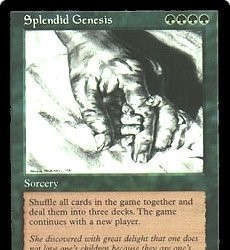
Of the existing celebration cards in MTG, Splendid Genesis is probably the most well-known card, having been listed on eBay and seen in auction houses a number of times over the years. Printed to commemorate the birth of his first child, only 110 copies were ever made and sent out to incredibly close friends and well known employees at Wizards. It was also drawn by Monique Thirifay (an early WotC employee), and to date, is the only card she has ever produced. The card effect is also wholesome and makes me feel happy.
For this card alone, the current market value is an estimated $10,000, which is an amazing price to behold, but probably worth it for something so unique.
Fun fact, Mark Rosewater is also a proud owner of one of these, if my information is correct, which makes a lot of sense.
Fraternal Exaltation
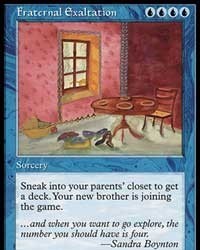
Fraternal Exaltation was a card done in the same fashion, printed to commemorate the birth of Garfield's second child. However, the amount released this time around was 220, a significant increase, and perhaps a sign of Wizards increasing growth as a company? Or Garfield had more friends, who knows.
This card however, was drawn by Susan Garfield, Richards sister and for me, personally, owning a celebration card drawn by your own sibling is far more amazing than just another Black Lotus.
Given that the print run for this card was significantly larger, the price is lower as a result, but prices still range from $3-$5,000, with those copies having been sold out already.
And of course, comes the best for last.
Proposal
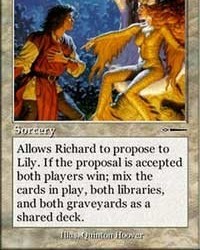
What follows is one of my favorite romance stories and the most feelgood MTG tale I've ever heard.
In October 1993, Garfield enlisted the aid of Dave Howell, and the late Quinton Hoover to create a unique and special card. Using this one of a kind piece, Richard was going to propose to his then-girlfriend, Lily Wu.
All together, a single sheet of 9 cards were produced, with one being used for a very special game: "According to Richard, he put just put one in the all-white deck he was playing. As luck would have it, the first three games the pair played, he didn't draw the card. He did finally find it in the fourth game, but was losing. At one point, Lily asked if he wanted to concede because, as a playtester, she didn't think any card he could play would allow him to win. Shortly after, Richard played the now-famous card" ~ MTG Librarities So, they did get married, and the 8 remaining copies were sent to family memebers, and Dave and Quinton. Unfortunately, Quinton's copy was stolen at some point, but it has been verified that this is not that copy. The most unique thing about this card, is that Richard and Lily told all of the owners never to reveal the original artwork to preserve the memory. That image up there? It's not the actual art, it has never been revealed to this day, and because of that, it is the greatest mystery in MTG history (there's another fake image out there too). Hence why Ralph has it covered up. As a result, it's no surprise that the only copy currently being sold is being offered at an astounding $35,000.
I could build a vintage deck with that kind of money. A good one too....
Altogether, the three cards are being sold off for a staggering $55,000. But for 2 cards that barely register in the 3 digit population, and another with just 9 copies in existence, and with all 3 of these being such an important part of MTG history, the price tag is well deserving. It's still a shame though, that we'll never see the original art for Proposal, but perhaps its best to keep it unique like this.....
I hope you all enjoyed the wonderful story behind these cards, and hope you'll retell it to other players as well.
If you wish to check out the original listing, feel free to check out the Misprints, Oddities, Rarities for Magic the Gathering Facebook group. There's always something amazing being listed there.
#MTG#Magic The Gathering#Splendid Genesis#Proposal#Fraternal Exaltation#Rare#Celebration Cards#Not Me#Richard Garfield
294 notes
·
View notes